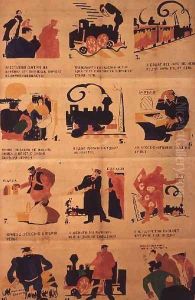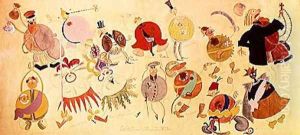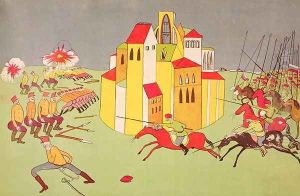Vladimir Mayakovsky Paintings
Vladimir Vladimirovich Mayakovsky was a Soviet poet, playwright, artist, and actor, known for his avant-garde and revolutionary style that was largely in line with the state ideology of the early Soviet Union. Born on July 19, 1893, in Baghdati, which was then part of the Russian Empire and is now in Georgia, Mayakovsky grew up in a climate of political unrest which would eventually inform his poetic style and content.
Mayakovsky started writing at an early age and was already a political activist by the time he was a teenager. His early poems reflect the influence of Symbolism, a late 19th-century art movement. However, his style evolved rapidly as he became associated with the Russian Futurist movement, a group that sought to break with the conventions of the past and celebrated the dynamism of the modern world. His poetry was characterized by its bold use of language, its unusual structure, and its direct engagement with contemporary issues.
In 1915, Mayakovsky wrote 'A Cloud in Trousers,' which earned him fame. His poem '150,000,000' criticized Western capitalism and idolized the Bolshevik leader Vladimir Lenin. Following the Russian Revolution of 1917, he initially embraced the new Soviet state's ideology and became an active participant in the cultural life of the young USSR. His works from this period include 'Left March' (1918) and 'Mystery-Bouffe' (1918), a play that celebrated the triumph of the proletarian over the bourgeois.
Despite his alignment with the Soviet authorities, Mayakovsky's relationship with the state was complex. He often found himself at odds with Soviet bureaucrats and was critical of certain aspects of Soviet life. His poem 'At the Top of My Voice,' written in the late 1920s, reflects some of his frustration with the Soviet system.
Mayakovsky's personal life was tumultuous and marked by passionate relationships, including his love affair with Lilya Brik, who was married to his publisher Osip Brik. This relationship, along with the pressures of his career and his disillusionment with Soviet policies, contributed to his emotional distress.
Tragically, Mayakovsky's life came to an early end when he committed suicide on April 14, 1930, in Moscow. His death was a shock to the cultural world and the Soviet establishment, and it led to a complex legacy. Initially, his work was promoted as the quintessence of Proletarian art, but as Stalin's regime became more conservative, Mayakovsky's avant-garde style fell out of favor. It was not until after Stalin's death that Mayakovsky's work was fully reassessed and his contribution to Russian and Soviet literature was fully recognized. Today, Mayakovsky is regarded as one of the key figures of 20th-century Russian poetry, and his works continue to be studied and celebrated.


